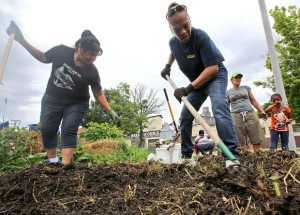
Photo by John Hart, State Journal archives. Elisha Rosas, left, and Carla McCants till soil in a community garden near the Goodman Community Center on Madison’s East Side. The pleasant, musky aroma after a rain is similar to what gardeners smell when they turn over their soil.
Many times after a rain, there is a distinctive odor in the air — a sort of musky smell. This pleasant fragrance is most common in rains that follow a dry spell.
The phenomenon is referred to as petrichor, from the Greek roots petra (stone) and ichor (the blood of gods in Greek mythology). If you are a gardener, you may find this smell similar to the smell you sense when you turn over your soil. Good organic soils contain bacteria, and a bacterium that is abundant in damp warm soils is actinomycete.
Actinomycetes are a key ingredient in the decomposition of organic materials in the soil.
They thrive when the soil is moist. When the soil dries out, the actinomycetes produce tiny spores. These spores are part of their reproduction cycle.
Rain kicks up these spores when the raindrops hit the ground and make them airborne. Air movements then disperse the spores and carry some of the spores to our nose, where we detect an aroma.
Actinomycetes are very common, which is why you experience the after-the-rain smell in many locations. Oil exuded by certain plants during dry periods also contribute to the smell.
You may have noticed that petrichor is more common after light rains than heavy rains. High-speed photography has shown that light rain results in small bubbles in the rain drop at the soil surface that can transport microbes from the soil when the bubble burst.

